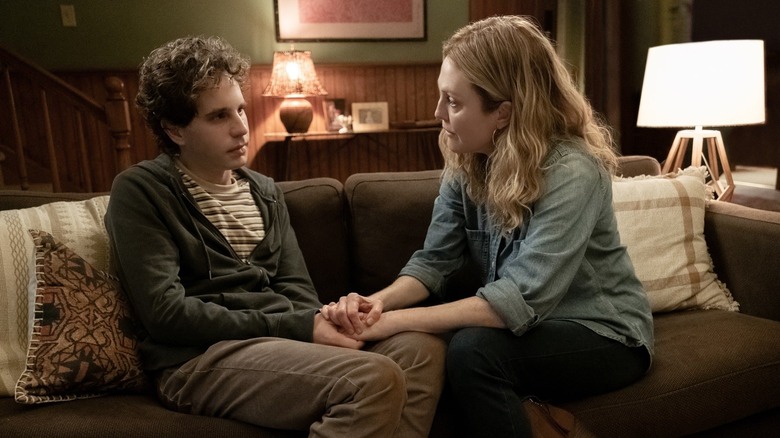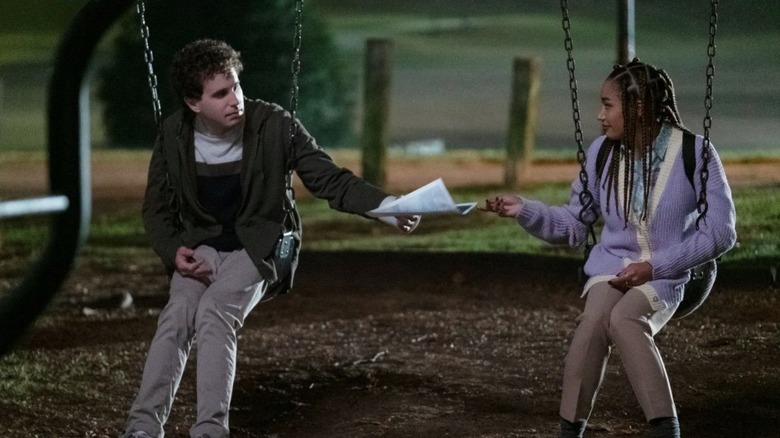Dear Evan Hansen Director Stephen Chbosky On Finding 'The Reality' In A Musical [Interview]
Stephen Chbosky knows a thing or two about teen angst. The author of "Perks of Being a Wallflower" adapted his acclaimed young adult novel into the delicate 2012 film starring Logan Lerman and Emma Watson, making his mark as a director with a finger on the pulse of teens dealing with such heavy issues as post-traumatic stress and depression. But on the screenwriting side of things, Chbosky has a surprising affinity for musicals. The filmmaker penned the feature adaptation of Broadway smash "Rent" and wrote Disney's 2017 remake of "Beauty and the Beast." So it's almost no surprise that he would combine his two major talents with "Dear Evan Hansen."
Taking Broadway by storm when it debuted in 2016, "Dear Evan Hansen" cemented Benj Pasek and Justin Paul as this decade's most popular songwriters and launched star Ben Platt into the hallowed hall of beloved Broadway stars. But almost immediately after its debut, the acclaimed "Dear Evan Hansen" was met with an equal amount of criticism, specifically for its depiction of mental illness, which some critics accused it of glamorizing.
A "testament to the power of skillfully crafted art to obscure moral concerns," Slate called "Dear Evan Hansen" in 2017. An at-times brilliant ode to the outsider "ultimately undone by pop psychology," said The New Yorker.
Chbosky was well aware of the criticism heading into his feature adaptation of "Dear Evan Hansen."
"We were able to be very detailed in how we dealt with mental illness and grief. In a way that on stage that you simply, you technically can't do," Chbosky told me in a /Film interview ahead of the release of "Dear Evan Hansen."
Chbosky and his team consulted with mental health professionals at the JD Foundation and the Suicide hotline, giving them "carte blanche."
"Because no movie is worth triggering some young person," Chbosky said.
I chatted with Chbosky about the hurdles of bringing Broadway musicals to the big screen, differences between the stage musical and the movie, and why he thinks his ending works better.
"We had to find the reality."
You have penned feature musical adaptations before, but now you take on directing a movie musical for the first time with "Dear Evan Hansen." As a director, is there now a focus on establishing the visual language for a musical in addition to any other adaptation challenges?
Oh, 100%. We knew going in that what was so successful on stage was, they were trying to capture a certain kind of reality on stage. But finding the actual places where it felt... He's singing at a dining room table, for God's sakes. It's a very different thing then most musicals, where suddenly you're in fantasy or whatever. We had to find the reality.
And so the visual language came from a combination of looking for those locations, trying to find the things that felt that they fit... When we couldn't find it, we built it. And ultimately, I had a lightning in a bottle aesthetic for the movie. I knew that I had this remarkable performer with Ben Platt and all the cast was fantastic.
And what I wanted to do was focus on, how can I give them the longest takes possible rather than a lot of cutting. Sometimes I use cutting to convey anxiety, but otherwise, I wanted to just let it happen because that's what theater is. It's the longer take, it's the longer scene. And so that was it. Yeah, I tried to capture that feeling that I felt watching it on stage, with Michael Greif's brilliant direction, and just translate it to real dining rooms in real homes.
So in the adaptation of a musical, is there an inherent hurdle of turning, for example, a five act play into a three act film? Because films are often structured as three acts, versus musicals that have five acts. So is there some difficulty in compressing the story for a feature film like that?
A little bit, yeah. We looked at it more like two acts becoming three. You have the intermission, and I knew that he took off the cast during the intermission every performance. So I was like, what if we stage an intermission with the cast coming off? Which was really fun to shoot.
So I guess where it really showed itself was in the third act. It was, what is the redemption of this character? The stage show, it ends differently. I don't know, have you seen the stage show?
I unfortunately only listened to the [original cast recording] soundtrack.
Okay, the soundtrack. Okay. Well, basically, the stage show has a slightly more rushed ending. And so we were able to, in that third act, we had a little bit more time to be able to explore the idea of Evan in search of Connor, which you can do in close-ups. You couldn't really do that on stage. If you think about it, there was no way of translating that.
So there were certain conventions and freedoms that we were allowed, which was very exciting. It allowed us to figure out Connor in a different way. Allowed us to figure out Evan's question a different way. And we're also able to show his redemption, I think, luckily, through his confession. It was really exciting to be able to do that for the film.
There are a number of other changes to the feature version of "Dear Evan Hansen." One of which being the change of Connor Murphy's father to a stepfather. And I've seen that there have been some discussions among fans as to whether this adds an unnecessary tension to Connor's relationship with his father figure. Because he's not his biological father, as opposed to how the original stage musical simply had their relationship strained, regardless of outside factors. What was the reason for making this change into being a stepfather versus a father?
The reason was Danny Pino. We saw a lot of different people, I had a lot of meetings. And Danny and I, we had a two-hour meeting over Zoom. He was in Los Angeles, I was in Atlanta. And I just loved the guy.
He threw himself on tape. We didn't even ask him to do it, he did it. He was so good that I was like, "It's this guy. This is the guy." And we all felt it. So he said, look, Danny is Cuban-American, and Kaitlyn [Dever] is not half Cuban-American and neither is Colton [Ryan]. So we thought, look, we want to be authentic in all ways. And when the right guy shows up, you do the right guy, and you use that person.
And when we really broke down Larry, in terms of what he has to do, we felt like it just added another dimension, but didn't break anything that was originally there. It just added this cool dimension. I threw it out, at the end of the day, the authors get to decide. It's their work. I'm there to translate it. So when we talked about it, and I thought, "Hey guys, what if she was a widow? And that Connor grew up to look like the husband that she lost..."
And we talked about, and we traced it all the way through the movie, it just broke all of our hearts in a completely different way. It added a layer. I don't think it subtracted anything. It actually added. Because nothing that Larry was before he was a stepfather was changed. We simply added to it.
"You feel these characters in a much more intimate way."
And you're familiar with the adaptation challenges, but when you were walking that route of whether to be more loyal to the original stage play, versus taking your own creative license... Where is the line that you draw? Or is that something that you navigate with the original book writers working with you in the process?
This is a team effort. This is three brilliant authors, myself, [producers] Marc Platt and Adam Siegel. And in many cases, the cast, having discussions about how do we make this the richest, deepest, truest version of this for film that we can possibly make it? This is not me putting some stamp on anything.
I do know something about adaptation, I've done a few of them, but I never adapt something unless I am an absolute, capital "F" fan of it. "Perks [of Being a Wallflower]" I wrote, but "Wonder," I love the book. I loved it. "Dear Evan Hansen," when I saw it on stage, I loved it.
So I was like, as a fan, let me try to protect this thing, but also to make the movie different enough that there's still a reason to see the stage show. I want it to run on Broadway forever because I love what that is. So some of that was informative as well. So, no, it was all hands on deck, all the time. We really moved it as a collective and as a team. And it was a real honor to be part of it. I jumped on a moving train. They had all been there years before I showed up.
So the original musical was not without its criticisms either, mainly in its depiction of mental illness. With the inclusion of songs like the one song by Alana [played by Amandla Stenberg], in your opinion, does the film more greatly address those difficult topics like mental illness, and suicide, and the effects that it has on everyone surrounding the people?
Well, I believe the film does it in a different way. Because we have the close-ups, because we're able to really isolate. You feel the family's grief in a different way. You feel these characters in a much more intimate way. Because again, if you see somebody up here, and you see a grieving mother here versus 50 feet away, it's a different experience.
And so by nature, we were allowed to be, I guess, I don't know if nuanced is the right word... But we were able to be very detailed in how we dealt with mental illness and grief. In a way that on stage that you simply, you technically can't do. It's not possible. So that was a very exciting addition to the film.
I also wanted to ask if you consulted with mental health experts in the production of this film as well?
Yeah, several. We talked to JD [Foundation], and also the Suicide Hotline people, and other groups. And we gave them carte blanche. We brought them in to look at an earlier cut and said, "It's yours. If there's anything to cut, you tell us, it's gone." Because no movie is worth triggering some young person.
So they had carte blanche. And at the end of the day, I was very grateful to know, or very, very happy, that there's only a couple of shots that they said, "These are very dangerous, get rid of those." They were gone. It wasn't even a discussion. They had to tell us because it had to be authentic and part of the solution, and not part of the problem.
"Dear Evan Hansen" hits theaters on September 24, 2021.


